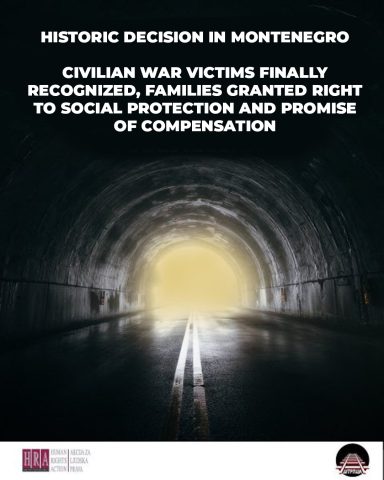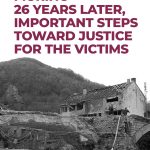
NO PROGRESS IN THE FIGHT FOR JUSTICE: 32 YEARS SINCE THE ŠTRPCI CRIME
27/02/2025
INEFFECTIVE INVESTIGATION INTO POLICE TORTURE DURING THE 2020 PROTESTS IN NIKŠIĆ
04/03/2025HISTORIC DECISION IN MONTENEGRO – CIVILIAN WAR VICTIMS FINALLY RECOGNIZED, FAMILIES GRANTED RIGHT TO SOCIAL PROTECTION AND PROMISE OF COMPENSATION

The Parliament of Montenegro today adopted a law of historic significance, which finally grants the status of civilian war victims in Montenegro to the abducted passengers from the train in Štrpci, the victims of enforced disappearances in Kosovo, those killed in the NATO bombing of Murina and Malesija, and all other individuals forcibly disappeared or killed after August 17, 1990. Additionally, the families of these victims are now entitled to social protection. The Government of Montenegro has also promised the families of the civilian war victims a one-time compensation payment.
This represents a significant civilizational step forward. The adopted amendments to the Law on War Veterans and Disabled Veterans now recognize all citizens of the former Socialist Federal Republic of Yugoslavia as civilian war victims, regardless of where they were harmed during the armed conflicts on its territory. The family members of these victims will gain the right to social protection in Montenegro if they hold Montenegrin citizenship. In this way, a long-standing appeal from the victims’ families and human rights activists has finally been fulfilled.
The Human Rights Action (HRA) and the NGO “Štrpci – Against Forgetting” welcome the adoption of these amendments, which have been awaited for over a year since the initially selective proposal was withdrawn from the procedure in December 2023. Civilian war victims are now finally comprehensively and systematically recognized, and their families have been granted rights that the families of fallen soldiers from the 1990s wars have had since 1998.
Until now, the families of civilian war victims in Montenegro had not been socially protected, despite suffering the heaviest losses due to war crimes and armed conflicts in the former Yugoslavia. Unlike the families of soldiers, who have been receiving benefits adjusted to the average salary in the country since the 1990s, the families of civilian victims were left to fend for themselves.
Considering all this, we particularly welcome the promise made by the Minister of Social Welfare, Family Care, and Demographics, Damir Gutić, that the families of civilian war victims will be compensated for the three-decade delay in enacting this law through a Government decision.
The passage of time has also resulted in the law only partially equating the families of civilian victims with the families of fallen soldiers in certain rights. Social benefits, in the form of family invalidity allowances and material security, can now only be claimed by the widows and parents of civilian victims, provided they are still alive. Children, brothers, and sisters, as a rule, remain outside the scope of these rights, as they are already over the age of 26 and no longer meet the legal conditions for social benefits (this condition does not apply if they were determined to be incapable of work before the age of 15 and have no other income).
For this reason, the Government’s decision on one-time compensation is key to rectifying the historical injustice faced by the families of civilian war victims in Montenegro and providing a just resolution to their issue. We expect this decision to be made very soon, in line with Minister Gutić’s announcement.






 English
English